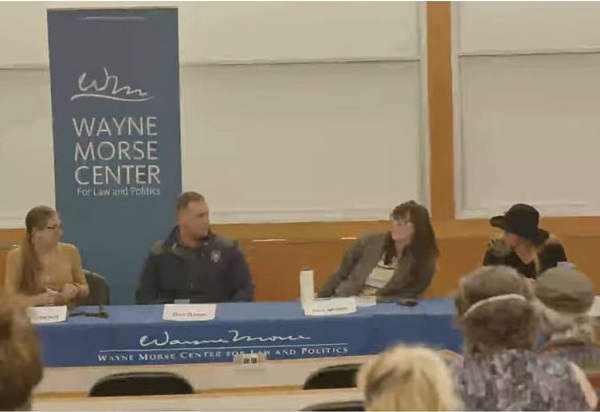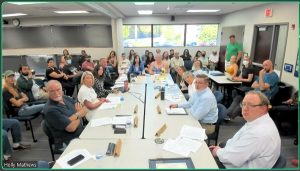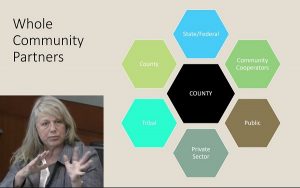Morse panelists see housing crisis roots in white supremacy, systems failure
8 min read
Our housing crisis is rooted in white supremacy and system failure, according to a recent panel discussion at the University of Oregon: Local volunteers and non-profits are stretched beyond capacity, and we need to move past old notions of religious charity. The Morse Center for Law and Politics hosted Everyone Village co-founder Heather Sielicki, Lane County’s Sarai Johnson, and Eugene Police Chief Chris Skinner.
[00:00:26] Eugene Police Chief Chris Skinner: It’s been important for me for the four years that I’ve been here to see how we try to kind of back our way out of a system that has been built to fail individuals over and over and over again.
[00:00:37] Oftentimes in many communities, our public safety system is kind of a catch basin for everything that has fallen through the cracks or has had other systems that have failed them, whether it’s the healthcare system or the mental health system or the housing system or their education system, we can see over and over again systems that have underperformed in meeting the needs of individuals.
[00:00:57] And then when it finally comes to an end or a breaking point, the last system, they call those three digits of 911 asking for help. And so we’re constantly thinking about how we back away from that.
[00:01:08] What are the systems we need to put in place that allows for our police officers to do really what they’re trying to do, which is to protect life and property safety and do great investigations and try to really intervene on behalf of the victims.
[00:01:21] And so I’m constantly thinking about how we do that, and, how do we, as a community identify the need, match the right resource and how do we fund it?
[00:01:29] Sarai Johnson: My role around homelessness and in particular unsheltered homelessness has evolved over time. I originally started as a joint employee of the City of Eugene and Lane County, the one and only that has ever existed. And let me just say, I don’t think they should try that again. No offense to anybody, it’s just hard. If you want to work for government, pick one. Just pick one.
[00:01:50] I found that unsheltered homelessness was becoming more and more of an urgent issue…In the whole country, about 35 percent of people who are unhoused are considered unsheltered, meaning they live in places not meant for human habitation. In our community, 80 to 90 percent of people are living unsheltered, meaning we’ve never had enough shelter capacity. We’ve got a very tight and extremely restrictive housing market, making it very difficult to enter into rental housing, and it’s also extremely expensive, one of the most unaffordable places to live in the country, and has been for many, many years.
[00:02:24] In all reality, homelessness at its root is a housing problem. Our housing market here is virtually impossible for somebody who doesn’t have a lot of resources or supports to break into if they don’t have money already. Many people who are unhoused in our community have jobs and they actually work. They can’t afford a place to live because affording a place to live here is very near impossible for most people right now.
[00:02:48] So my work has shifted more into housing production and the county is taking its first steps into housing production support and finding ways to add more housing stock across the county and finding appropriate ways to partner with municipalities and unincorporated communities to help them leverage the housing resources, bring the barriers to building housing and so forth.
[00:03:09] One of the big reasons why it’s so hard to build here in Oregon and so difficult to identify places where people are able to go is because we have extremely strict land use policies.
[00:03:22] And as you are probably all aware (and if you’re not, get ready for a real big surprise), Oregon was officially founded as a white-only state. Those policies that we have around land use conservation and the way that we develop land are rooted in that white supremacist exclusionary founding, and we have never gone back to the drawing board to, you know, unroot those, and maybe see what we want to keep and what we don’t want to keep. So right now we’re sort of just trying to make adjustments to the way things have always been, but we’re really kind of growing out of a bit of a rotten root.
[00:03:54] So that is a big challenge and that’s a much bigger lift than what our day-to-day work is. But overall, I do believe that changing those white supremacist policies and adjusting how we’re approaching this to really focus on housing first, along with the support that people need to stay in housing and be successful there, are really the key to solving/ending homelessness.
[00:04:18] Heather Sielicki: I’m Heather Sielicki, and I’ve been obsessed with solving the problem of unsheltered homelessness since 2015, because an unsheltered camp moved down the street from my house, and for me, it led to a long path of trying to understand why people are neglected in this way.
[00:04:37] So I started working with the government. Back then there was no public shelter. There was just a Christian mission shelter. And I started working with the folks in the religious organizations to find out what was going on. And I found that a lot of them were just trying to keep people alive, and on a long road of, sort of trying to help people, and then they would get swept by the police, and then trying to help them get into another place, basically hiding them.
[00:05:09] So I went into this professionally. I went to work at White Bird Clinic and working with CAHOOTS and seeing what they were doing. And they were doing the same thing. I mean, where’s CAHOOTS going to take people? Sixty percent of their calls are just transport. And without shelter, they’re they’re helping people hide in bushes too.
[00:05:28] I ended up hooking up with an evangelical church planter who had an interest in serving the homeless, and we were able to establish a safe sleep site which now shelters about 50 people. I was very interested in the model of Mobile Loaves and Fishes, which is out of Austin, Texas, where they they provide housing for people who’ve been chronically homeless and have a variety of housing types like micro shelters and RVs, you know, whatever they can scrounge up to get together. And we were able to establish that here in West Eugene.
[00:06:02] What I really have found in working with a lot of unsheltered homeless people is that they have tried to get help so many times but because our systems are so shoddy, they have been failed over and over again. Government like the city and the county haven’t really ever worked together well on this.
[00:06:23] And, what I’ve noticed is this is a systems collapse, of all kinds of things breaking down at once. And we keep trying to solve it with individual blocks and it will never be solved. We have to work together as the system has failed and created this housing crisis.
[00:06:41] There’s 4,000 people on the streets right now, living unsheltered. And they’re not going to have a place to live anytime soon, right? We’re 20,000 units short on affordable housing for the people who are living here now. So it’s time for us all to understand this. Everybody who’s out there, they’re part of our community.
[00:06:59] And if we want to be an inclusive place to live, then it’s time for us to really work together. And take this seriously,
[00:07:06] John Q: Heather said we can’t rely on charity.
[00:07:09] Heather Sielicki: And you have a lot of people who are saying, ‘Well, you know, it’s the job of the religious people to serve the poor well.’ There’s a whole lot of different ideas around what serving the poor looks like. And if we continue to try to use the old fashioned charity model where, you know, by helping somebody, you’re going to get, like, a better seat in heaven. I don’t know. It’s not going to work. It’s not going to work to solve the level of problems that we have right now.
[00:07:41] You cannot solve this problem through the charity of Good Samaritans because they don’t understand how serious this problem is. We’ve got to bring in all of the players: The businesses, the churches, the government the nonprofits. They all have to start working together, because otherwise we’re working at cross purposes.
[00:08:01] John Q: Sarai also addressed the charity model.
[00:08:03] Sarai Johnson: Speaking to this charity model and the religious sort of origins of the idea that religious organizations are the ones who should be taking responsibility for caring towards the poor is a very paternalistic way to think about it.
[00:08:20] The way that we think about charity, we have expectations for people. They need to be grateful. They need to be deserving of our help. They need to earn it somehow. They need to change their behavior. We want them to change it because we are the right one. That is white middle class norms that we’re putting on other people who do not have the capacity, the experience, and the culture to be ready to do that immediately.
[00:08:44] Blaming individuals for systemic problems is endemic in the way that we live and think and make policy. We continue doing that in spite of evidence to very much to the contrary that it is not an individual problem, but that rather, individual risk factors are exacerbated when systems fail.
[00:09:01] Heather Sielicki: I’m very encouraged by the amount of safe sleep sites and rest stops that have come up in the city of Eugene in the past few years. But that’s COVID money, that’s temporary money and in 18 months, all of that funding runs out. So we can continue to put money in temporary things, but we can’t ask people to trust that they’re going to last. So it’s almost foolish for anyone to really trust that these systems are going to work.
[00:09:30] You know, services can open, but that doesn’t mean they’re accessible or available.
[00:09:35] I mean, look at the way we treat assisted living— with some respect. We know that people need to have an extra advocate. That doesn’t happen.
[00:09:43] We don’t have an ombudsman program for people experiencing homelessness, right?
[00:09:48] We don’t have a standard of care and do the people who are unsheltered homeless know that? Yes they do.
[00:09:54] John Q: Addressing the housing crisis at the University’s Morse Center, Eugene Police Chief Chris Skinner, Lane County’s Sarai Johnson, and Everyone Village co-founder Heather Sielicki.



